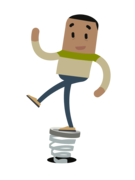
Anxiety and panic
What is it?
Anxiety is a feeling you get when you think something bad or dangerous might happen. Your body gets ready to fight or run away. You may breathe faster, sweat, or feel tense.
Panic is a very strong kind of fear. It comes quickly and feels very intense. You may feel like you are not in control.
Past experiences can make panic worse. Sometimes you don’t notice your thoughts, but they can make fear turn into panic.
How does panic feel?
- Physical: Possible physical sensations include dizziness, hyperventilation, palpitations, sweating, vomiting, feeling of an unrealistic situation, etc. Some may even have the idea that they are experiencing a heart attack;
- Behavioural: Avoidance of anxious stimuli;
- Psychological: Mulling.
What can you do?
It may seem like a good idea to hide your fear or avoid scary situations. But this often makes it worse later.
If you keep avoiding something, you stay afraid of it. It is better to talk about it. Tell someone you trust how you feel.
You can also get help. Panic attacks can be treated well. One common treatment is called EMDR.
You can go to your doctor (general practitioner, GP) for help. If that feels too difficult, you can also talk to a student psychologist. They can help you too.
Healthcare in the NetherlandsSelf-learning module
With your Fontys account, you can make free use of online self-help modules (e-health).
Anxiety
If you often feel anxious or have panic attacks, you’re not alone. This self-help module can help you understand and manage your anxiety, so it doesn’t get worse.
Go to the Anxiety and panic module
Resilience
Want to build more resilience? This module helps you understand how you react to setbacks and teaches you how to deal with them better in the future.
Go to the Resilience module
Contact
Book your appointment with a student psychologist or a student counsellor.
Book an appointmentWho can you contact?
- You can contact a student psychologist if you are experiencing complaints, worries, or problems for which you don’t immediately see a solution. They offer short‑term therapy.
- If your mental well‑being is affecting your study progress, if you want to request special arrangements, or if you are struggling with motivation issues, then you should make an appointment with a student counsellor.
